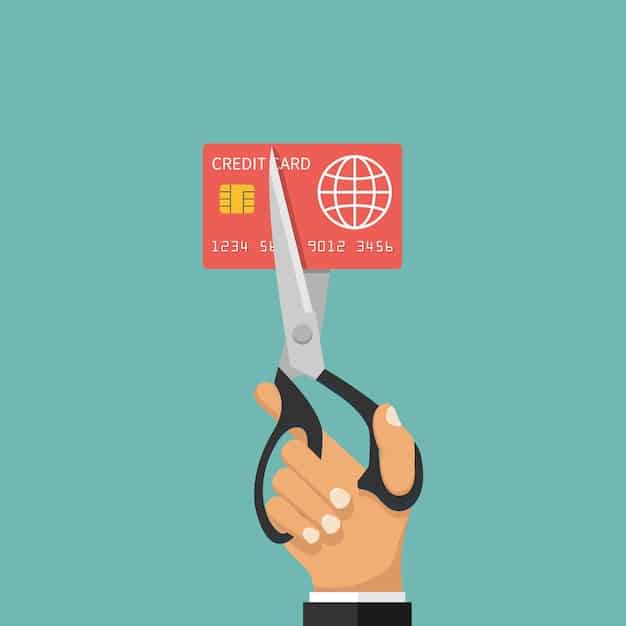Avoid These 5 Credit Score Mistakes Costing You Thousands in 2025

Avoid these 5 common credit score mistakes in 2025 to protect your financial health, including ignoring credit reports, maxing out credit cards, closing old accounts, missing payments, and neglecting credit utilization, all of which can significantly impact your creditworthiness.
Your credit score is a crucial part of your financial life, influencing everything from loan approvals to interest rates. Making smart financial decisions is important but understanding the common pitfalls that can harm your credit score is just as crucial. Avoid these 5 common credit score mistakes in 2025 that could end up costing you thousands of dollars.
Why Your Credit Score Matters
Your credit score is a numerical representation of your creditworthiness, based on your credit history. It plays a pivotal role in many aspects of your financial life. Understanding its significance is the first step in protecting and improving it.
Financial Opportunities
A good credit score opens doors to various financial opportunities. It can make it easier to secure loans, mortgages, and credit cards with favorable terms and interest rates. Landlords and insurance companies often check credit scores, too.
Lower Interest Rates
One of the most tangible benefits of a good credit score is access to lower interest rates. Whether you’re applying for a mortgage, auto loan, or credit card, a higher credit score can save you thousands of dollars in interest payments over the life of the loan.
- Impact on Loans: A poor credit score may lead to higher interest rates on loans.
- Credit Card Approval: Better rates and rewards are available with a good credit score.
- Long-Term Savings: Lower interest rates translate to substantial savings.
Understanding the importance of your credit score is the first step in making informed financial decisions. By avoiding missteps that could lower your score, you not only protect your current financial status but also ensure access to better opportunities in the future.
Mistake #1: Ignoring Your Credit Report
One of the most common and costly mistakes is ignoring your credit report. Many people don’t realize the importance of regularly checking their credit report for errors or signs of fraud.

Spotting Errors
Credit reports can contain inaccuracies that can negatively affect your credit score. These errors can range from incorrect personal information to accounts that don’t belong to you. Regularly reviewing your credit report allows you to identify and correct these errors promptly.
Detecting Fraud
A credit report can also reveal signs of identity theft or fraudulent activity. Unauthorized accounts or inquiries listed on your report could indicate that someone has stolen your personal information and is using it to open accounts in your name.
- Annual Review: Obtain and review your credit report at least once a year.
- Dispute Errors: File disputes with the credit bureaus immediately.
- Monitor Regularly: Consider using a credit monitoring service for real-time alerts.
Ignoring your credit report is a major pitfall that can lead to a lower credit score and potential financial harm. Regular reviews not only help you correct errors but also protect you from fraud and identity theft. By making it a habit to check your credit report, you stay informed and in control of your financial health.
Mistake #2: Maxing Out Credit Cards
Another significant mistake that can seriously harm your credit score is maxing out your credit cards. Carrying high balances relative to your credit limits can negatively impact your credit utilization ratio, a key factor in credit scoring.
Credit Utilization Ratio
Your credit utilization ratio is the amount of credit you’re using compared to your total available credit. Lenders look at this ratio to assess how well you manage your credit. A high credit utilization ratio signals that you may be overextended and at a higher risk of default.
Impact on Credit Score
Maxing out your credit cards can significantly lower your credit score. Experts recommend keeping your credit utilization below 30% to maintain a good credit score. Using a large portion of your available credit can indicate financial distress, even if you make your payments on time.
- Keep Balances Low: Aim to keep your credit card balances well below 30% of your credit limits.
- Multiple Cards: Even if you have multiple credit cards, avoid maxing any of them out.
- Debt Management: Work towards paying down high balances to improve your credit utilization ratio.
Maxing out credit cards is a credit score mistake many people make. By keeping your balances low and managing your credit utilization ratio, you’ll not only improve your credit score but also demonstrate responsible credit management. Responsible credit management will open doors to better financial opportunities in the future.
Mistake #3: Closing Old Credit Card Accounts
Closing old credit card accounts might seem like a good way to simplify finances, but it can actually harm your credit score. The length of your credit history and available credit are crucial factors considered by credit scoring models.
Length of Credit History
The age of your credit accounts contributes to your credit history. Closing older accounts reduces the average age of your credit history, indicating less experience managing credit. This can negatively impact your creditworthiness.
Reduced Available Credit
Closing credit card accounts lowers your overall available credit, which in turn can increase your credit utilization ratio. As previously mentioned, a higher credit utilization ratio can lower your credit score. Keeping older accounts open, even if you don’t use them, helps maintain a healthy credit utilization ratio.

- Keep Accounts Open: Unless there’s a compelling reason, keep old credit card accounts open.
- Inactive Cards: Use inactive cards occasionally to keep them active.
- Review Fees: If fees are a concern, consider downgrading to a no-fee card instead of closing the account.
Closing old credit card accounts is a mistake that impacts both the length of your credit history and your credit utilization ratio. Keeping those accounts open can provide a boost to your credit score over time. Responsible management is the key to maintaining a healthy credit profile.
Mistake #4: Missing Payments
Missing payments is detrimental to your credit score. Payment history is one of the most significant factors in determining your creditworthiness. Even a single late payment can have a negative impact, and multiple late payments can cause significant harm.
Payment History Impact
Lenders view missed payments as a high-risk indicator. Timely payments show that you are reliable and can manage your debts responsibly. A history of missed payments, on the other hand, raises concerns about your ability to repay future debts.
Late Payment Consequences
Late payments can stay on your credit report for up to seven years. The impact of late payments diminishes over time, but the initial damage can be substantial. Additionally, late fees and increased interest rates can add to the overall cost of borrowing.
- Set Reminders: Use reminders to ensure timely payments
- Automatic Payments: Set up automatic payments to avoid missed due dates.
- Contact Lenders: Contact lenders immediately if you anticipate difficulty.
Missing payments harm your credit score and your overall financial health. While one of the biggest factors you can control regarding your score, many people miss payments due to negligence. By prioritizing on-time payments and taking proactive steps to manage your debts, you can maintain a strong credit profile and avoid the costly consequences of late payments.
Mistake #5: Neglecting Credit Mix
While not as critical as payment history or credit utilization, neglecting your credit mix could keep you from reaching your highest possible credit score. Credit mix refers to the variety of credit accounts you have, including credit cards, installment loans, and mortgages.
Variety of Accounts
A healthy credit mix indicates that you can manage different types of credit responsibly. Having both revolving credit (like credit cards) and installment credit (like loans) can demonstrate your ability to handle various financial obligations. Some lenders will be looking for this.
Strategic Approach
It’s important to note that you shouldn’t take on debt just to improve your credit mix. The goal is to diversify your credit profile without overextending yourself financially. A balanced approach involves responsibly managing existing credit accounts while considering adding new ones when appropriate.
- Assess Your Needs: Only consider new credit accounts if they align with your financial goals.
- Manage Existing Accounts: Focus on managing credit cards and loans.
- Avoid Overextension: Don’t take on new debt just to improve your credit mix.
Neglecting your credit mix can limit your ability to achieve an excellent credit score. Be strategic about diversifying your credit portfolio without overextending yourself. Prioritize responsible management of both revolving and installment credit accounts. You can protect your credit more effectively.
| Key Point | Brief Description |
|---|---|
| 🔍 Check Credit Report | Review regularly for errors and fraud. |
| 💳 Avoid Maxing Cards | Keep balances below 30% of credit limit. |
| ⏳ Keep Old Accounts Open | Protect credit history and utilization. |
| 🗓️ Pay Bills On Time | Timely payments are crucial for a good score. |
Frequently Asked Questions
▼
It’s a good practice to check your credit report at least once a year. You can obtain free credit reports from the three major credit bureaus: Experian, Equifax, and TransUnion.
▼
A good credit utilization ratio is generally below 30%. For example, if you have a credit card with a $1,000 limit, try to keep the balance below $300.
▼
Closing a credit card can reduce your overall available credit and shorten your credit history, potentially lowering your score. It’s often better to keep unused cards open.
▼
Late payments are typically reported to credit bureaus after 30 days past the due date. Once reported, they can negatively impact your credit score.
▼
Yes, the variety of credit accounts you have, known as your credit mix, can influence your credit score. Having a mix of credit cards, loans, and mortgages can demonstrate responsible credit management.
Conclusion
Protecting your credit score is vital for your financial well-being. By avoiding these 5 common credit score mistakes, you can build and maintain a strong credit profile, opening doors to better financial opportunities in 2025 and beyond. Stay informed, manage your credit wisely, and secure your financial future.





